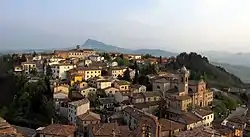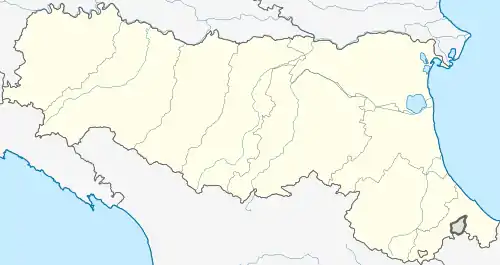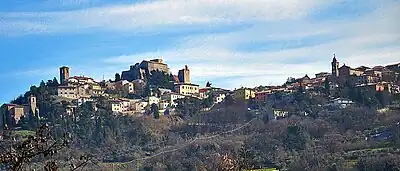Verucchio | |
|---|---|
| Comune di Verucchio | |
 Verucchio | |
 Coat of arms | |
Location of Verucchio | |
 Verucchio Location of Verucchio in Italy  Verucchio Verucchio (Emilia-Romagna) | |
| Coordinates: 43°59′N 12°26′E / 43.983°N 12.433°E | |
| Country | Italy |
| Region | Emilia-Romagna |
| Province | Rimini (RN) |
| Frazioni | Villa Verucchio, Ponte Verucchio, Pieve Corena |
| Area | |
| • Total | 27 km2 (10 sq mi) |
| Elevation | 330 m (1,080 ft) |
| Population (31 December 2004)[2] | |
| • Total | 9,365 |
| • Density | 350/km2 (900/sq mi) |
| Demonym | Verucchiesi |
| Time zone | UTC+1 (CET) |
| • Summer (DST) | UTC+2 (CEST) |
| Postal code | 47826 |
| Dialing code | 0541 |
| Patron saint | Saint Martin |
| Saint day | November 11 |
| Website | Official website |
Verucchio (Romagnol: Vròcc) is a comune in the province of Rimini, region of Emilia-Romagna, Italy. It has a population of about 9,300 and is 18 kilometres (11 mi) from Rimini, on a spur overlooking the valley of the Marecchia river. It is one of I Borghi più belli d'Italia ("The most beautiful villages of Italy").[3]
History
Traces of a 12th-9th century BC settlement, supposed of Villanovan origin, have been found overlooking the Adriatic plain. Later it was an Etruscan possession. The current town derives its name from Vero Occhio ("True Eye"), referring to its privileged position offering a wide panorama of the surrounding countryside and the Romagna coast.
Malatesta da Verucchio, founder of the Malatesta lordship of Romagna, was born here. His successors fortified it as a powerful bastion against the Montefeltro of Urbino. After the expulsion of the Malatesta (15th century), it was a fief of the Medici in the Papal States; it remained part of the latter, with a short stint under the Republic of Venice, until 1620.
Demographic evolution

Main sights

- Rocca Malatestiana (Malatesta Castle, 12th-16th century; also known as Castel del Sasso, or "Castle of the Rock"). It is one of largest and better conserved Malatestian fortifications, and was the birthplace of Malatesta da Verucchio. In 1449 Sigismondo Pandolfo Malatesta enlarged it.
- Archaeological Museum
- Rocca del Passerello with the annexed gate.
- Romanesque-Gothic Pieve, dating around 990.
- Franciscan Convent (c. 1215), the most ancient in Romagna. Inside the church is a masterpiece of the 13th century Riminese painting school representing the crucifixion. Outside is a 700-year-old cypress that, according to the legend, was planted by St. Francis himself.

References
- ↑ "Superficie di Comuni Province e Regioni italiane al 9 ottobre 2011". Italian National Institute of Statistics. Retrieved 16 March 2019.
- ↑ "Popolazione Residente al 1° Gennaio 2018". Italian National Institute of Statistics. Retrieved 16 March 2019.
- ↑ "Emilia Romagna" (in Italian). Retrieved 31 July 2023.